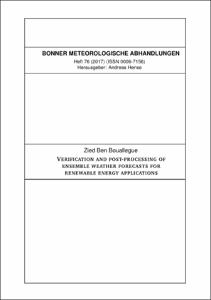Ben Bouallegue, Zied: Verification and post-processing of ensemble weather forecasts for renewable energy applications. - Bonn, 2017. - Dissertation, Rheinische Friedrich-Wilhelms-Universität Bonn.
Online-Ausgabe in bonndoc: https://nbn-resolving.org/urn:nbn:de:hbz:5n-46713
Online-Ausgabe in bonndoc: https://nbn-resolving.org/urn:nbn:de:hbz:5n-46713
@phdthesis{handle:20.500.11811/7152,
urn: https://nbn-resolving.org/urn:nbn:de:hbz:5n-46713,
author = {{Zied Ben Bouallegue}},
title = {Verification and post-processing of ensemble weather forecasts for renewable energy applications},
school = {Rheinische Friedrich-Wilhelms-Universität Bonn},
year = 2017,
month = jul,
volume = 76,
note = {The energy transition taking place in Germany encourages a large scale penetration of weather-dependent energy sources into the power grid. The grid integration of intermittent sources increases the need for balancing demand and supply in order to ensure the reliability and safety of the power system. In this context, forecasts are essential for the cost-effective management of reserves and trading activities. Solar and wind power forecasts with a time horizon of few hours up to several days are usually based on outputs of numerical weather prediction systems routinely provided by weather centres. At the German Weather Service, the high-resolution ensemble prediction system COSMO-DE-EPS is called to support renewable energy applications which require dealing with the intermittency and uncertainty in the energy production. In this study, ensemble forecast verification and post-processing are addressed focusing on global radiation, which is the main weather variable affecting solar power production.
First, the ensemble forecast performances are assessed from the user’s and developer’s perspectives. New tools are proposed for the verification of quantile forecasts which are probabilistic products appropriate for many renewable energy applications. Forecast discrimination ability and value are assessed considering users with different aversions to under- and over-forecasting. Moreover, a new measure is introduced in order to summarize the added value of the ensemble approach with respect to a single run approach. The new skill score is conditioned on calibration, that is, statistical consistency between the distributional forecasts and observations. Second, an enhanced framework for the post-processing of ensemble forecasts is proposed. The aim is to provide the users with calibrated consistent scenarios which are required for the optimization of complex decision-making processes. Therefore, a two-step procedure is developed starting with the marginal calibration of the forecasts based on quantile regression and the selection of appropriate predictors. Next, consistent scenarios are generated using a dual ensemble copula coupling approach which combines information from past error statistics and the dependence structure in the original ensemble forecast.},
url = {https://hdl.handle.net/20.500.11811/7152}
}
urn: https://nbn-resolving.org/urn:nbn:de:hbz:5n-46713,
author = {{Zied Ben Bouallegue}},
title = {Verification and post-processing of ensemble weather forecasts for renewable energy applications},
school = {Rheinische Friedrich-Wilhelms-Universität Bonn},
year = 2017,
month = jul,
volume = 76,
note = {The energy transition taking place in Germany encourages a large scale penetration of weather-dependent energy sources into the power grid. The grid integration of intermittent sources increases the need for balancing demand and supply in order to ensure the reliability and safety of the power system. In this context, forecasts are essential for the cost-effective management of reserves and trading activities. Solar and wind power forecasts with a time horizon of few hours up to several days are usually based on outputs of numerical weather prediction systems routinely provided by weather centres. At the German Weather Service, the high-resolution ensemble prediction system COSMO-DE-EPS is called to support renewable energy applications which require dealing with the intermittency and uncertainty in the energy production. In this study, ensemble forecast verification and post-processing are addressed focusing on global radiation, which is the main weather variable affecting solar power production.
First, the ensemble forecast performances are assessed from the user’s and developer’s perspectives. New tools are proposed for the verification of quantile forecasts which are probabilistic products appropriate for many renewable energy applications. Forecast discrimination ability and value are assessed considering users with different aversions to under- and over-forecasting. Moreover, a new measure is introduced in order to summarize the added value of the ensemble approach with respect to a single run approach. The new skill score is conditioned on calibration, that is, statistical consistency between the distributional forecasts and observations. Second, an enhanced framework for the post-processing of ensemble forecasts is proposed. The aim is to provide the users with calibrated consistent scenarios which are required for the optimization of complex decision-making processes. Therefore, a two-step procedure is developed starting with the marginal calibration of the forecasts based on quantile regression and the selection of appropriate predictors. Next, consistent scenarios are generated using a dual ensemble copula coupling approach which combines information from past error statistics and the dependence structure in the original ensemble forecast.},
url = {https://hdl.handle.net/20.500.11811/7152}
}






